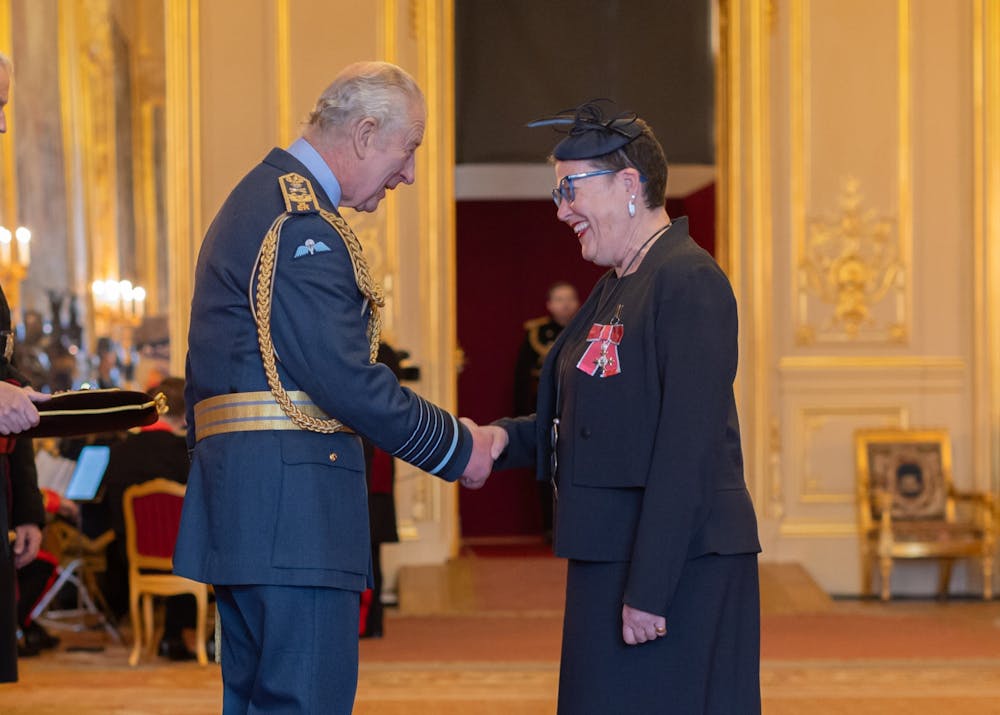Terrie Moffitt, Nannerl O. Keohane University professor of psychology and neuroscience, was appointed a Member of the Most Excellent Order of the British Empire (MBE) on Feb. 8. The award was presented to her by King Charles III at a Windsor Castle ceremony.
As a researcher who grew up in the U.S. and later gained dual citizenship in the U.K., Moffitt saw the honor as a symbol of acceptance.
“It was a big moment in my life. It was really surprisingly meaningful for me,” she said. “It sort of felt like, you know, getting married or something — quite exciting!”
The MBE, established by King George V in 1917, rewards contributions to the arts, sciences, charitable work and public service.
A licensed clinical psychologist, Moffitt first gained popularity for the Dunedin study, which studies a population sample of people born in 1972 and 1973 in Dunedin, New Zealand throughout their lives. Now in its fifth decade of operation, the study has resulted in numerous reports and policy changes.
Although Moffitt is internationally recognised for the Dunedin study, that is not the extent of her research. Some of her other work includes the Environmental Risk Longitudinal Twin study, which documents the lives of British twins, and a recent U.S. government study on post-traumatic stress disorder and accelerated aging in post-9/11 veterans.
Moffit’s work largely focuses on the intersection of psychology and medicine, such as on development, genomics, neuropsychology, aging and mental health.
Her groundbreaking work has led to multiple honorary doctorates and her election to the National Academy of Medicine in 2018.
Moffitt recalled her meeting with King Charles III at Windsor Castle, describing him as warm and affable.
“He spoke first, and he said to me, ‘Professor Moffitt, I understand that you study ways to help people with mental health with mental illness,’” Moffitt said.
“And then he said, ‘Well, tell me something. Are there new homeopathic herbal medicines that work to help people with mental health problems?’ And, you know, I speak from Duke University, I was sort of caught on the backfoot. But I said, ‘Well, not yet. But maybe during our lifetime, Your Majesty’,” Moffitt recalled. “He laughed. He stuck out his hand. I shook hands with him. And then I had to walk backwards out of the room.”
“We were yucking it up, you know? We were laughing about the idea that herbal remedies would cure schizophrenia. I thought he had a great sense of humor.”
Dr. Moffitt began her career after earning her bachelor's degree in psychology from the University of North Carolina at Chapel Hill, before earning a master’s in experimental animal behavior and a Ph.D. in clinical psychology in 1984 from the University of Southern California.
Her thesis, which Moffitt says inspired her later work, studied over 5,000 Danish men born in the 1920s and 1930s to see whether their criminal and medical records contained their biological or adoptive parents’ medical histories.
“To me, the strength of having the entire population was just so powerful. It was really quite seductive,” she said. “I would not be interested, in any way, in doing a small experiment with 20 undergraduates on campus. That just wouldn't send me.”
She began working on the Dunedin study in January 1985, as she wanted to work with a large sample size and was intrigued by how children became involved in crime. The study tracked children under 13 years old, which was uncommon at the time.
According to Moffitt, a particularly notable outcome of the study is examining the effects of leaded gasoline on brain development. Moffitt conducted brain scans on middle-aged test subjects whose blood work was previously examined by the study when they were 11 years old. This allowed her team to explore the psychological effects of increased blood lead levels caused by leaded gasoline.
Moffitt's research found that the children with high levels in their blood grew up with brain abnormalities, lower IQ and higher incidents of anxiety and depression compared to children who had lower levels of lead in their blood.
While the findings were "not enough to derail one individual's entire life," Moffitt noted that these individual effects can lead to nationwide effects.
As Moffitt has grown older, her motivation to continue psychology research has become more personal, especially as she began to focus on the effects of aging and mental health.
Moffitt views her future work as contrasting with current trends in the field of psychology.
“The field is going more and more in the direction of cognitive neuroscience, which is very experimental, which is not so much my thing,” she said. “It's almost like my work has gone more in the direction of public health epidemiology. So over the years, I've become less and less of what you would [call] a classic psychologist.”
Get The Chronicle straight to your inbox
Signup for our weekly newsletter. Cancel at any time.
Samanyu Gangappa is a Trinity sophomore and local/national news editor for the news department.

